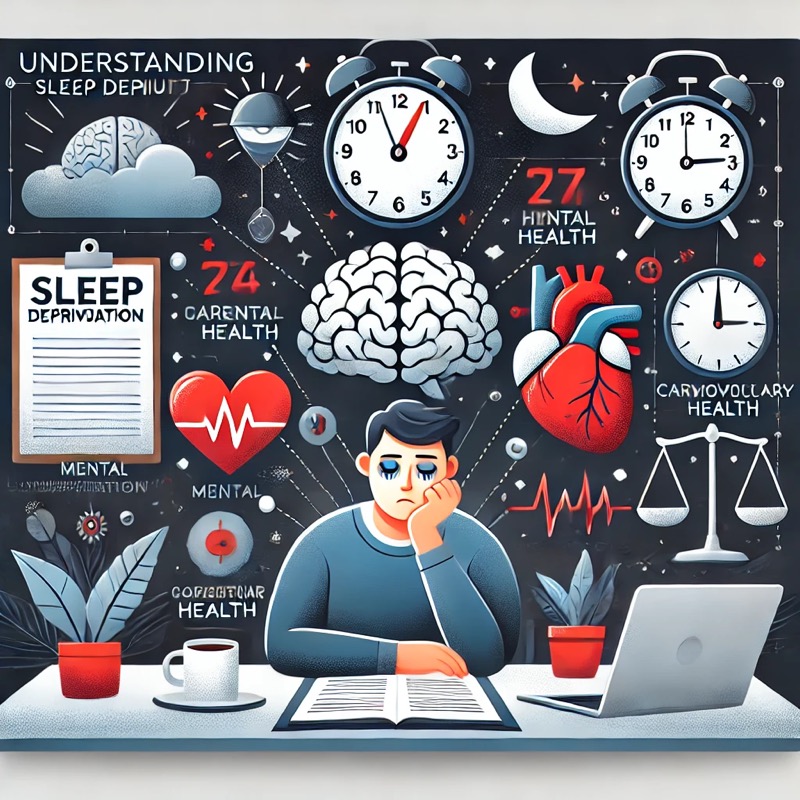
Which of the following statements about sleep deprivation is false?
December 9, 2024
Question: Which of the following statements about sleep deprivation is false?
Options:
- a. Sleep deprivation often results in depression-like symptoms.
- b. Sleep deprivation can result in decreased mental alertness and cognitive function.
- c. Sleep deprivation often results in ADHD.
- d. Sleep deprivation is associated with obesity.
Answer: c. Sleep deprivation often results in ADHD.
Brief Explanations:
- Depression-like symptoms (a): Sleep deprivation can lead to mood disturbances, including depression-like symptoms such as irritability and sadness.
- Cognitive function (b): Lack of sleep impairs mental alertness, concentration, and memory.
- ADHD (c): While sleep deprivation can worsen ADHD symptoms, it does not directly cause ADHD, which is a neurodevelopmental disorder.
- Obesity (d): Sleep deprivation affects appetite-regulating hormones, leading to increased cravings and potential weight gain, linking it to obesity.
Extended Knowledge:
Sleep Deprivation and Mental Health
- Mood Disorders: Chronic sleep deprivation increases the risk of developing mood disorders like anxiety and depression, and it can exacerbate existing conditions.
Sleep and Hormonal Regulation
- Impact on Hunger Hormones: Sleep deprivation disrupts the balance of hormones like ghrelin and leptin, which regulate hunger and fullness, contributing to overeating and weight gain. Here are four similar or related questions about sleep deprivation, formatted as requested:
Similar Questions
Question 1 Which of the following is NOT a common effect of sleep deprivation?
Options:
- a. Decreased immune function
- b. Improved decision-making abilities
- c. Increased risk of heart disease
- d. Difficulty concentrating
Answer: b. Improved decision-making abilities
Brief Explanations:
- Decreased immune function (a): Sleep deprivation weakens the immune system, making the body more vulnerable to infections.
- Increased risk of heart disease (c): Chronic sleep deprivation is linked to a higher risk of cardiovascular problems.
- Difficulty concentrating (d): Lack of sleep impairs cognitive abilities, including focus and concentration.
- Improved decision-making abilities (b): Sleep deprivation typically impairs decision-making and judgment, rather than improving it.
Question 2: What is a potential long-term consequence of chronic sleep deprivation?
Options:
- a. Improved metabolic health
- b. Increased risk of diabetes
- c. Enhanced physical endurance
- d. Decreased risk of obesity
Answer: b. Increased risk of diabetes
Brief Explanations:
- Increased risk of diabetes (b): Chronic sleep deprivation is linked to insulin resistance, increasing the risk of Type 2 diabetes.
- Improved metabolic health (a): Sleep deprivation disrupts metabolic functions, which can lead to weight gain and other issues.
- Enhanced physical endurance (c): Sleep is critical for recovery, and lack of sleep negatively affects physical performance.
- Decreased risk of obesity (d): Sleep deprivation actually increases the risk of obesity due to hormonal imbalances that affect hunger.
Question 3: Which of the following is true regarding the relationship between sleep deprivation and mental health?
Options:
- a. Sleep deprivation has no impact on anxiety levels.
- b. Sleep deprivation can worsen symptoms of depression and anxiety.
- c. Sleep deprivation is only linked to short-term mood changes.
- d. Sleep deprivation improves overall mood and stress resilience.
Answer: b. Sleep deprivation can worsen symptoms of depression and anxiety.
Brief Explanations:
- Worsen symptoms of depression and anxiety (b): Lack of sleep can exacerbate mental health issues, leading to more severe symptoms.
- No impact on anxiety levels (a): Sleep deprivation is known to increase anxiety and stress.
- Short-term mood changes (c): Sleep deprivation causes both short-term and long-term effects on mood and mental health.
- Improves mood and stress resilience (d): Sleep deprivation tends to lower mood and increase stress sensitivity.
Question 4: How does sleep deprivation affect appetite?
Options:
- a. It suppresses appetite by decreasing ghrelin levels.
- b. It increases appetite by decreasing leptin levels.
- c. It has no effect on appetite regulation.
- d. It decreases appetite by increasing cortisol levels.
Answer: b. It increases appetite by decreasing leptin levels.
Brief Explanations:
- Increases appetite (b): Sleep deprivation lowers leptin (which suppresses appetite) and raises ghrelin (which stimulates appetite), leading to increased hunger.
- Suppresses appetite (a): Sleep deprivation actually increases, not decreases, appetite.
- No effect on appetite regulation (c): Sleep deprivation significantly alters appetite-regulating hormones.
- Decreases appetite (d): Sleep deprivation typically leads to increased appetite, not decreased, due to hormonal changes.